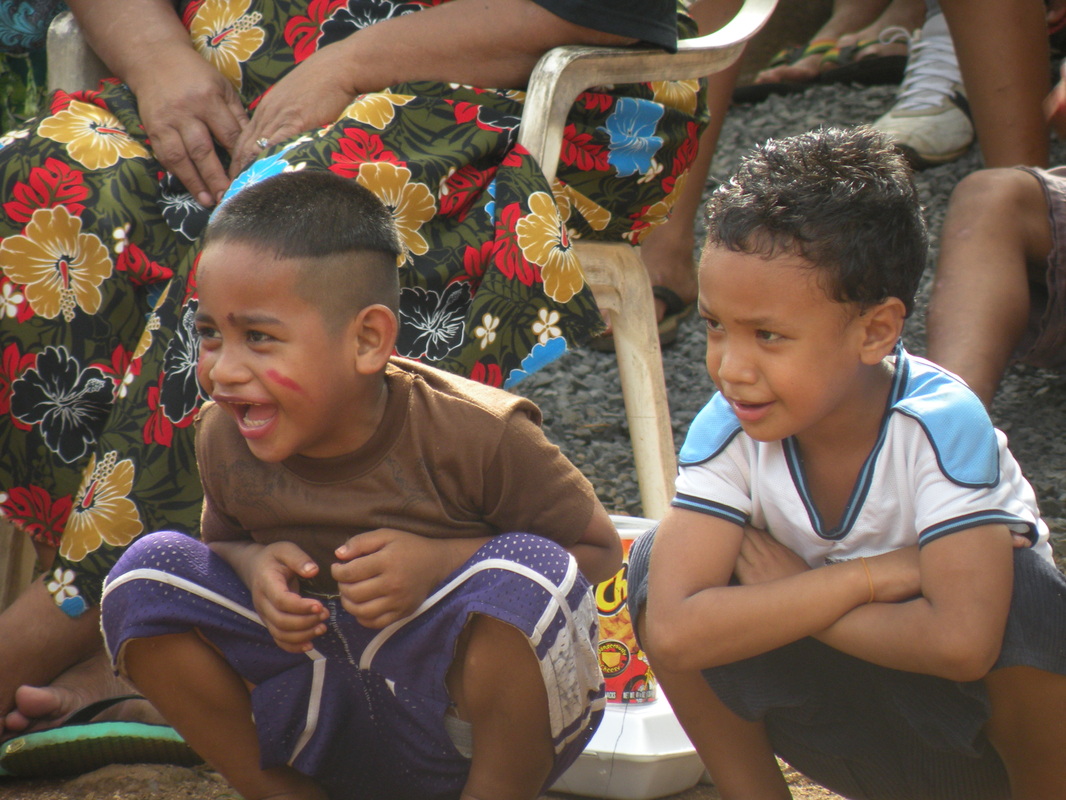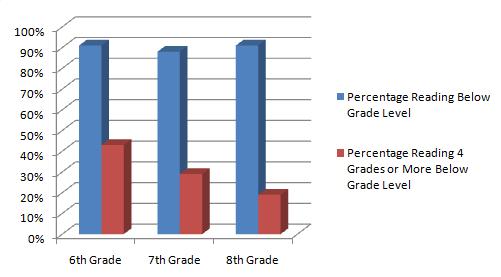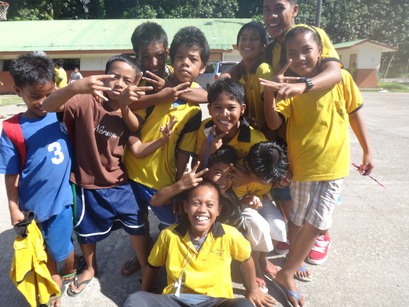 Hanging out with students at Sokehs Pah Elementary _ This past week we finally jumped into the classroom with both feet, teaching English. We broke the students into two groups, with the lowest performing students working with me on the very basics and the rest being taught by Mr. B. I always try to talk with students after school and during recess to help them practice their English. I ask them things like what they do for fun, what their favorite movie is, and who they know from America. I have some bad news: the number one answer to the latter question is Justin Bieber. The number two answer doesn’t get any better: Miley Cyrus. Despite my disappointment, I had a blast getting to know the kids and it really helps them to practice their English with a native speaker. I should be clear though that the amount of work to be done is immense. This week I taught letter sounds and some very simple vocabulary words. All of this was kindergarten, first and second grade material being taught to 6th, 7th and 8th graders. What I’m stressing to the students and constantly reminding myself though is it doesn’t matter where the students are now – what is of the greatest magnitude is if they make progress and are stronger in their English skills when we leave. I suppose this type of rationalization is necessary when facing a challenge of this size. We are currently waiting to hear back from one of the embassies where we have submitted a grant to receive 15 iPads. MAHI International has also written a grant for 160 iPads – for a total of over $100,000 when adding in the carrying cases and application costs. These will be incredibly helpful educational tools that will pay huge dividends in the classroom. We are currently seeking to get five people like me next year – one volunteer in each of our adopted schools. It has become abundantly clear that we need a native English speaker in each of our schools every day; once a week simply is not enough. I am very confident we’ll make great progress in our schools this year, but having a volunteer in each school every day will produce truly tremendous gains. Below is the description of the position in case you or anyone you know is interested in serving here in beautiful Pohnpei! Outside of work, this past Saturday was one of my favorite days so far here in Micronesia. John, Dale and I woke up at 6:00am to go to Manta Row, to swim with the Manta Rays. It is about a 45-minute boat ride from Kolonia and we needed to get there early when it was at the right tide. I had been there once before, a couple of days before Christmas but it was with a big group and we got there too late, so the current was very strong and most of the Mantas were gone. This time, with just the three of us, we arrived right on time. It was truly incredible. There was a giant school of Rainbow Runners, where the Mantas like to feed on the tiny fish. We stayed close to the Rainbow Runners and the Mantas were right next to us. One time, John grabbed my arm and pointed to my right, and a Manta was literally five feet away. A quick safety disclaimer for those who are wondering, Manta Rays are harmless. It is advised though not to touch them as they have bacteria on them that makes humans sick. Throughout all of this I was excited to capture these incredible creatures on film thanks to my recently arrived underwater camera. I have been told continually that I need to post more pictures, so this pocket camera will literally remain attached at my hip from here on out! Check out the video below to see the Mantas in action! I will just say quickly that no video or image can capture what it’s like to be surrounded by so much life. It can only truly be experienced firsthand! After an hour and a half of swimming with the Mantas we headed back to Kolonia. Dale and I each had a chance to drive the boat which was really fun! We grabbed some food real quick and headed to meet with our friend Kohei, a professional surfer from Japan who recently moved to Pohnpei. He took us, his kids and some friends out to see Nan Madol, the site of an ancient kingdom, made up of these gigantic, extremely heavy rocks. Nobody knows how these rocks got here and how this immense rock city was constructed. I like to call it the “Stonehenge of the Pacific” and have also heard it called the “Atlantis of the Pacific.” It really is an incredible place. Below is a picture of Nan Madol, and I’ll elaborate on the history and structure in an upcoming post. After walking around Nan Madol for a while we hung out on Kohei’s boat fishing and snorkeling. To top the day off, Dale and I went to Joy Restaurant which has the best fried tuna and sashimi I have ever eaten. All in all, an awesome day. (Side note: I'll post all of my recent pictures in my next post!) Just a quick note – my apologies for not posting every Thursday (EST) like I said I would; as you can see I have been very busy! I will do my best though to hold true to my weekly deadline from here on out. Thanks for reading! Volunteer Posting MAHI International is a 501 (c) (3) non-profit organization based in Pohnpei, Federated States of Micronesia, focusing on healthcare, education and leadership development projects throughout Micronesia. Committed to serving the individuals and communities throughout the Pacific Island region, MAHI International’s vision is to increase the quality of life of the people in undeveloped communities. Focusing primarily in Micronesia, MAHI International works largely on improving healthcare and education throughout the islands, while training local Micronesian leaders. For more information, please visit www.mahi-intl.org Position Description MAHI International is looking for English teachers to instruct students throughout public schools on the island of Pohnpei, FSM. Teachers will be placed in one of MAHI International’s adopted schools to focus on improving the reading proficiency of students in grades 6-8. Teachers will also collaborate with school administration, community leaders and parents. The position is for the 2011-2012 school year. No teaching experience is required. Teachers will receive free housing and a living stipend. Qualifications - Fluent English speaker
- 21 + years in age
- Minimum 2 years of college experience
- Hold a US Driver’s License
- Ability to live and work in a remote location within a small community
- Ability to work both independently and as a member of a team
- Excellent communication, social and problem-solving skills
- Willingness to be flexible and adjust to changing circumstances
If interested, please contact Kat Schroer, Program Director at [email protected]
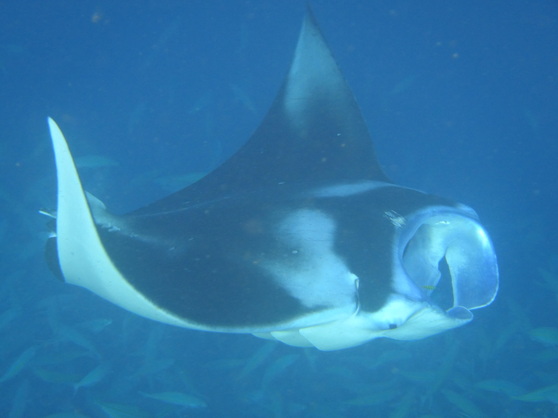 Manta Ray up close 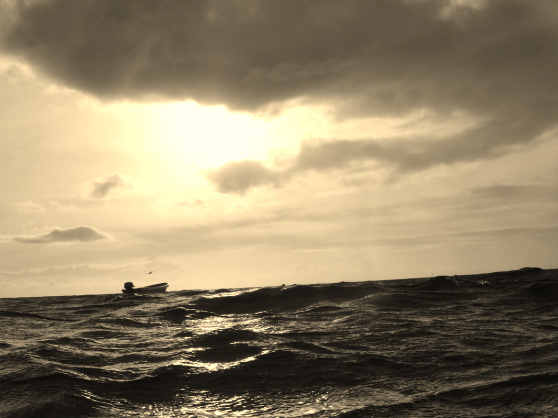 View of our boat while snorkeling with the Mantas 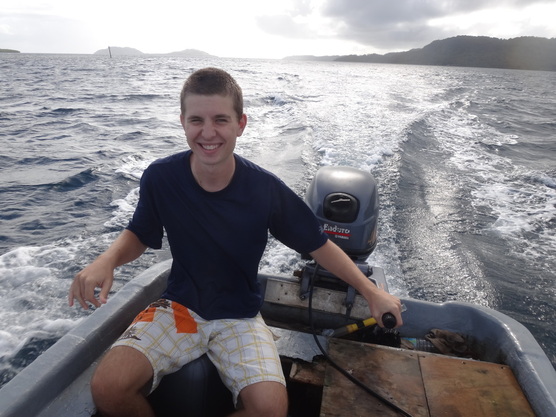 Driving the boat! 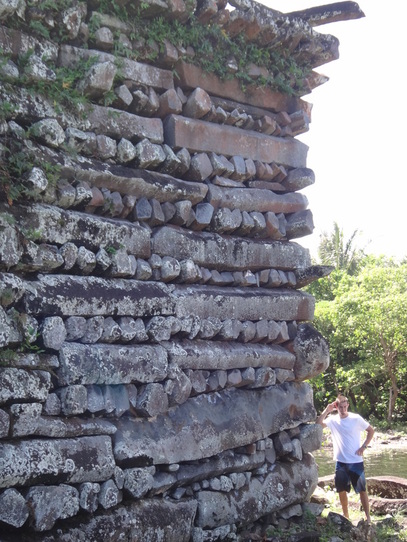 Dale showing the size of a wall at Nan Madol
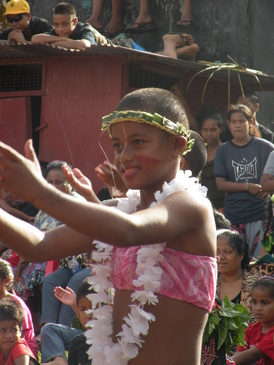 _ I had the opportunity last week to visit the Kapinga Village here on Pohnpei to witness local dancing. The Kapinga people are from the island of Kapingamarangi, the southernmost island of Pohnpei State, 740km away. The dances were in celebration of the New Year, a big event here on Pohnpei. For an entire week locals banged on pots, pans, 55 gallon drums – anything. A common scene was having 10-15 people piled in the back of a pick-up truck driving around making plenty of noise. For those not driving around, groups assembled on the side of the road to make a ruckus and spray water on all the cars driving by them. Often, many would be screaming “HAPPY NEW YEAR” or “PARAKUP MWAO” with a blood clenching intensity. It was an interesting cultural encounter to be sure and unlike any New Years I have previously experienced. Below is a video of some Kapinga boys demonstrating proper hula technique. Pardon my giggling, MAHI works with and mentors Nicky (inset) - and this was just too funny! The rest of the pictures can be found here. Overall, the whole event was an eclectic mix of dances and skits. It went from country music ho-downs to hula to toddlers gracefully expressing themselves through dance. On the education front, we visited all our adopted schools this past week, meeting with the principals and setting up our schedule for the rest of the school year. Currently, our plan is to travel to one school each day (five schools for each day of the week), teaching a 30-minute lesson in grades 6, 7, and 8 and staying after school to work with the students who are most in need. Mr. B will be working with the majority of the students while I will be taking the lowest performing 5-10 students per class. MAHI International has been given the generous donation of several Hooked on Phonics programs which I will be using in bringing these kids up to speed. We are hopeful we will receive our iPads within the next month to use them in our program. I have no illusion of how difficult and challenging the task will be to teach students to read who are reading at a first grade, kindergarten or even illiterate level. In the same breath, I can think of few things more worthwhile than teaching a child how to read. I will not be alone in this endeavor as Mr. B will be a guiding hand with his 35+ years of experience in education. It’s incredibly exciting though after all of this time evaluating and assessing to actually have the opportunity make a difference.
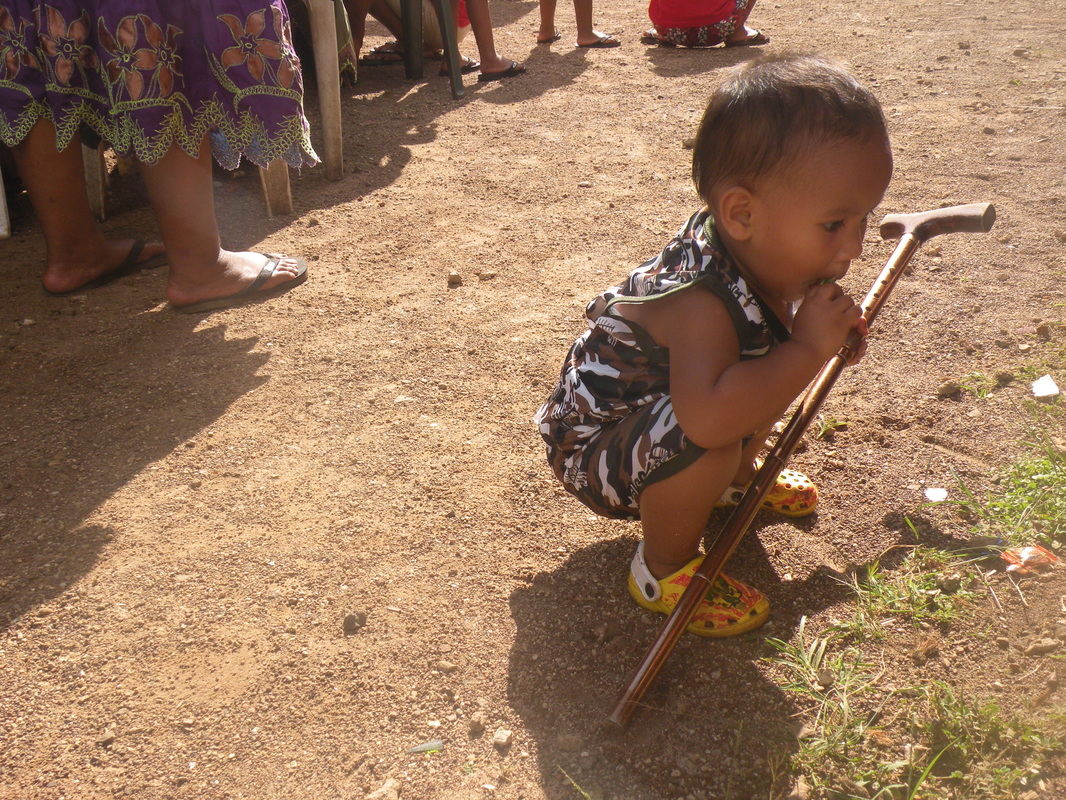 One of my favorite most recent shots entitled "Young to Old"
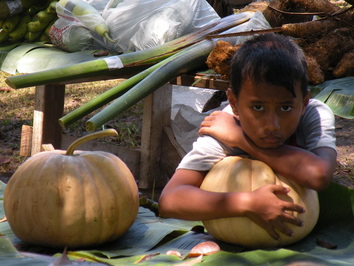 __ The world has 6.8 billion people. Pohnpei, a tiny island in the middle of the Pacific Ocean, has a population just under 36,000. I’m willing to bet a large sum that the vast majority of you probably first heard of Pohnpei through my coming here. I know this because out of the probably over 100 people I talked to about my plans to serve here, only one person had ever heard of Micronesia. Indeed, in the world of current affairs, Pohnpei and Micronesia are not at the top of the Google search. When discussing how to fundraise and effectively solicit funding for our various projects, one of the main questions I have proposed is how do we get people to care about this tiny island? There are many possible answers to that question. The first that comes to mind is obvious - “these are people too – why should they receive any less attention or resources just because they live on a small island?” This is perhaps the best answer. When it comes to our education projects however, I have a special answer to why Pohnpei matters. In the developing world there is an overwhelming lack of educational resources. Only the extraordinary students will flourish and have a chance to further their education at the collegiate level or beyond. Throughout Micronesia however, this is not the case. Thanks to the US government, students here have the same privileges found on Native American reservations – access to a free education through the graduate level. This isn't written anywhere, but the number of scholarships available is immense, to not just the exceptional students, but the average and below-par as well. There are not many places in the world where the youth have this much access to a free college and graduate school education. The tragedy though is the amazing opportunities available to these students are regularly wasted. When students do take advantage of these scholarships and go to college, they often face so much remedial education that they drop out after a semester or flounder and go to school for six years before their funding runs dry. Of course there are exceptions to this, but this is the general trend. If these students managed to catch up with their reading proficiency, developed an intellectual curiosity, and pursued further education, the sky truly is the limit. It all starts though with bringing these kids up to speed so they are reading at or above grade level. We have a program in place that will make a difference in the lives of these students. The entire MAHI team has a sense of urgency that is palpable. It’s exciting to be part of this movement to help improve the education system here on Pohnpei. This is all a very, very slow process, but we are in this for the long haul. Would you like to join the movement? MAHI International is supported solely by generous individuals. Click here to learn how to make a gift! There's nothing much worse than wasted talent and opportunity. If we follow the status quo, nothing will change and this failed system will continue to produce students unprepared to continue their education. With support, we can buck this trend and change lives, generating students with an extremely bright future taking advantage of all the opportunities presented before them. I recognize my last few posts have focused on education - I promise my next post will be focused on my interactions with the culture and my experiences in and around Pohnpei!
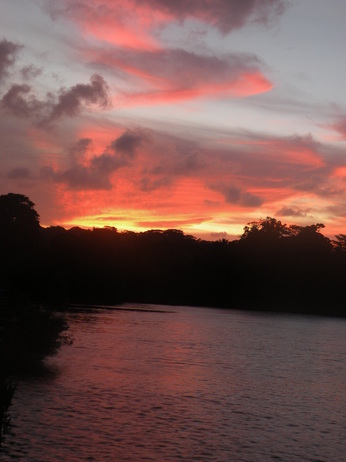 Recent sunset on the outskirts of Kolonia
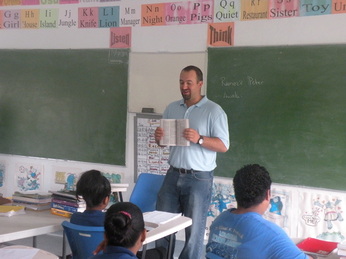 John introducing the dictionaries In the public eye, there is a clear distinction between non-profit organizations – faith-based or secular. The former engage in proselytizing activities while the latter focus on providing basic human services or raising awareness for a cause. Often however, the distinction is not so black and white. MAHI International is one of the organizations that falls in the gray area. Described as a “Christian-driven” organization, MAHI focuses on providing for the needs of the islanders, in areas such as healthcare, education and energy. From a personal perspective, I believe sharing the Gospel is one of the most valuable services you can provide. In the same breath, I believe it’s possible to live out the Gospel by helping others in different ways. MAHI has done this by donating beds to a hospital, working to improve literacy in the schools, and installing solar panels on outer islands, just to name a few. This reflects one of my favorite quotes from St. Francis of Assisi: “Preach the Gospel at all times and when necessary use words.” This past Wednesday, the MAHI team assisted in the delivery of new dictionaries donated by the Rotary Club to all 8th graders on Pohnpei, visiting over 15 schools. Many of the kids were absolutely stoked to receive their early Christmas present. In one school, the teacher told all her students on Monday that they needed to have a dictionary by Friday. We asked how many had purchased one yet – we saw no hands. Shortly thereafter, the teacher said we were “sent from above!” That wasn’t the first time I have heard such a comment. Indeed, as a Christian-driven organization fulfilling secular needs, I always smile when I’m reminded that we are doing God’s work. While it would be great to hand out Bibles, the majority of these students are reading three grades or more below grade level, as found by our student reading level assessments. Mind you, that assessment was only testing if the student could read the words – comprehension wasn’t even a factor. Distributing dictionaries won’t educate these students and send them to college, just like handing out Bibles won’t immediately lead to spiritual revival. Both are only mere steps in a long journey. I went to college in a campus that can fairly be defined as liberal, like most college campuses. Every year the Gideons came to town and handed out free pocket Bibles. I was always excited to receive a free Bible, but was disappointed to see other students take the Bible and throw them out, or openly ridicule the people distributing them. While in theory handing out “the good Word” is never a bad thing, it was obvious that it was going to take a lot more than handing out a book to convert anyone that day. Similarly, we have a lot more work on our hands to combat illiteracy on Pohnpei than just handing out dictionaries. There is no silver-bullet solution, but these dictionaries are another tool in our arsenal. We are moving forward in our education program, working out logistics regarding our community night with all the schools, where we plan to present all our results and galvanize support for education among the parents and community leaders. The Christmas spirit is in the air, which is weird for me given it's over 80 degrees every day!
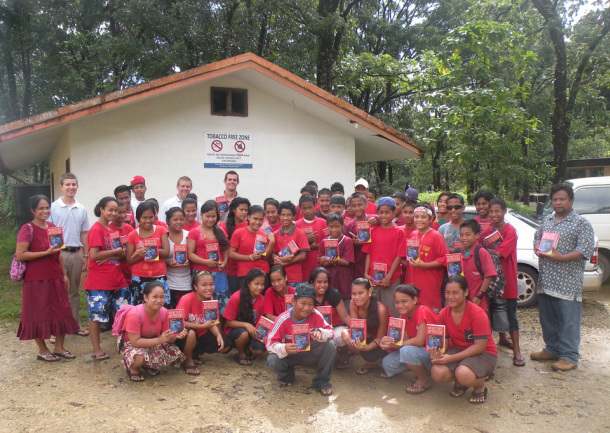 With all the 8th Graders at Pohnlangas Elementary School 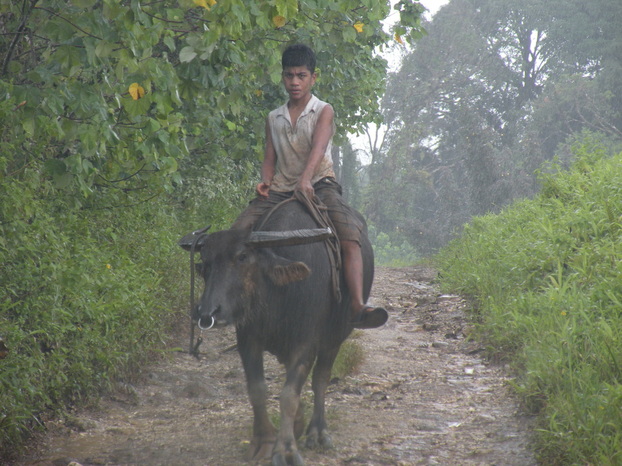 A little roadblock on the road to Salapwuk Elementary School
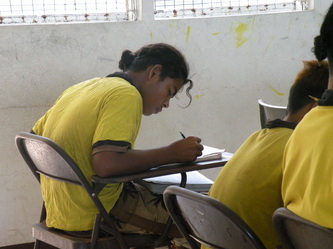 A student working at Sekere School The answer for every single issue in our world is simple: education. That might seem like a broad statement, but try to think of a problem that can’t be solved by an educated citizenry. Most issues are extremely complex and it is foolish to seek a silver bullet solution. However, it is imperative we recognize how crucial it is that the children of today know how to think critically and express their beliefs and opinions through oral and written mediums. The future will be built upon science, math and engineering, while we will progress through our ability to read and write. Education opens up a world of possibility if only we hold high standards and recognize our limitless potential. I am not familiar with any statistical study proving this, but I believe that the area most critical to the success of a school or education as a whole in a selected area, is the presence or absence of a culture of achievement. If the standards are high at all levels – government administration, school officials, teachers, parents, community leaders and students – success is inevitable. Again, that might seem broad or simplistic, but after spending four years in an environment with high intellectual standards, it’s hard to ignore the lack of such standards here in Pohnpei. I want to be crystal clear on one thing – these students, including the ones who are extremely behind, are not dumb. They are very industrious, creative and downright tough (I have yet to see a Pohnpeian kid cry, despite witnessing some nasty falls). They are simply the products of a failed system. The institutions and traditions that make up this system are deeply entrenched and steeped in a culture of ambivalence. Working within this system has been a challenge to say the least. God is no doubt teaching me the importance of patience (over and over and over). Despite any frustrations, I have enjoyed working with the kids conducting the student reading level assessments. Many times after finishing the assessment I would encourage the student to read more, adding “Knowledge is power!” It might be a bit corny, but it’s true! When I say “knowledge,” I’m not referring to knowing dates wars started and what an old white guy said (though as a history buff, those are good things to know!). For these kids, “knowledge” is reading proficiency. Here’s how it goes for far too many Pohnpeian students: - Enter high school 3-4 years behind in their reading level
- Get pushed through high school, being lucky if reading at an 8th grade level at graduation
- Enter COM (College of Micronesia) if pass entrance exam
- Face far too much remedial education at COM, become discouraged and drop out after less than a year
Of course this isn’t the course of events for every Pohnpeian, but it is certainly a notable trend. If these kids enter high school 3-4 years behind, unless they are lucky enough to run into an amazing teacher somewhere, they are on a track for failure. Here’s the problem. Now we’re going to do something about it. We visited all the principals of our adopted schools this week presenting them our report which included our recommendations derived from our teacher and principal evaluations and the results from our student reading level assessments. The principals were especially excited to get each student’s reading level. Now that they know what level each student is reading they can work with each student appropriately, giving him or her the proper amount of attention and assigning the proper resources. Indeed, knowledge is power. (Side note: I’m planning on posting on the blog once a week, on Thursday or Friday – so to most of you who read this, on Wednesday or Thursday. Occasionally I’ll post more often, and I might be delayed in posting if the Internet goes down like it did for a while this week. Just an FYI.)
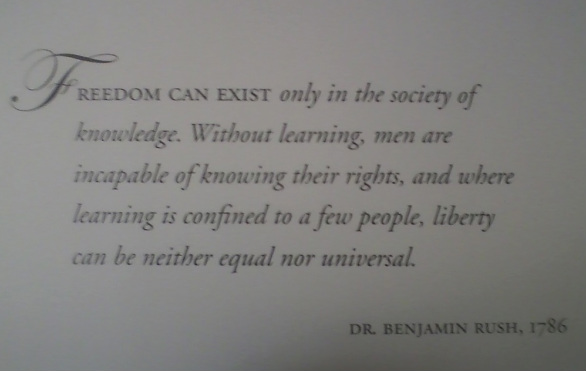 A quote from Dr. Benjamin Rush, founder of Dickinson College, on the wall in the Dickinson Admissions Building
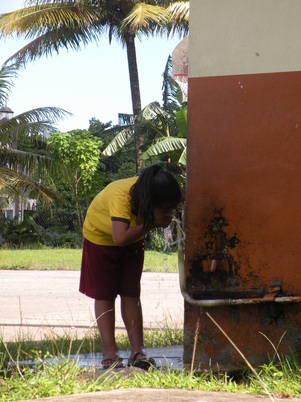 A Pohnpeian Water Fountain After much contemplation, research and analysis we finally have a plan that I am confident will make a major difference in helping the schools we have adopted. I have already posted the results from our time in these schools in case you were curious of their current status. Our plan consists of the following three-prong approach, with the initial goal and how we intend to accomplish each goal: Create a collaborative community and school partnership- Hold a community night at each school, inviting students, parents, teachers, administrators, and traditional leaders of the community. The focus will be on the importance of education for the future of each child, the community, Pohnpei, and the world.
- Work with each school’s PTA, introducing new strategies for parents to support and encourage their children’s education.
Strengthen leadership at the administrative level- Encourage and support school principals by having one-on-one appointments with the principal and Mr. Miller Benjamin, MAHI International’s Senior Educator. These meetings will occur on a five-week rotating schedule, with Mr. Benjamin meeting with one principal a week.
- Hold a second principal workshop in January with the five principals of the schools we have adopted.
Teach English and introduce new strategies to the teachers- Use tablet computers installed with English learning software to improve each student’s reading level. We will be visiting one school a day (a school for each day of the week) and teaching in grades 6, 7 and 8 for one period. This will consist of a 20-minute lesson from the MAHI International Education team, followed by 30 minutes of the students working on the tablets, completing work related to the lesson for the day. The teachers will also complete this lesson so they can become familiar with the teaching strategies presented in the tablets software.
- Hold a two-hour workshop once a week with all the teachers at the school. This will occur on a five-week rotating schedule. Each workshop will focus on a specific topic that is integral to successful teaching (ex. lesson planning, classroom management, etc.)
This is the basic outline of our plan, as each step obviously involves more details. So how did we get to this plan might you ask? Well let me start with the first two parts, creating a collaborative community and school partnership and strengthening leadership at the administrative level. I stumbled across a few pamphlets called the “Micronesian Counselor” published by MicSem and authored by Francis X. Hezel, SJ, who has been serving in Micronesia for decades. I read Hezel’s conclusion that throughout his years of observation, the only schools that are successful are ones who have community support and strong leadership at the principal level. My past experience speaks to this, when I interned at the White House Center for Faith-Based and Neighborhood Partnerships at the US Department of Education, whose chief goal is to stress the importance of community support in education. I traveled across the country and witnessed firsthand how critical community support is for a school to be successful, and how difficult it is to cultivate this relationship. Reflecting on my own brief couple of months in the Pohnpei schools, I couldn’t help but agree with Hazel. There are many obstacles in the way of achieving these two goals of which are the most absolute necessity to achieve any sort of success, but I believe we are at a great advantage knowing what is most important to produce any sort of long-lasting change. The last part of our approach, teaching English and introducing new strategies to the teachers, took a lot of deep thought. In case I haven’t made it clear, English is the second language to every child in these schools as they are first introduced to their native tongue of Pohnpeian. The vast majority of their teachers have graduated from the College of Micronesia with an AA degree, where all classes are taught in English. Despite obtaining their degree, many of the teachers are not comfortable with their English skills. I witnessed several teachers teaching English lessons incorrectly. Simply put, many teachers are just not qualified to teach English. Mr. B was the principal of the local SDA School here for the past 19 years. He oversaw its rapid growth, almost doubling in size and becoming one of the best schools on the island. I asked Mr. B why the SDA school was so much more successful than the public schools. While there are many possible answers to that question, his immediate response was because they were being taught by native English speakers. The majority of the SDA teaching staff is composed of SMs (Student Missionaries), most of whom are taking a gap year in college to teach here in Pohnpei. Ideally, we want to bring volunteers to all the public schools, whether from Peace Corp, World Teach, or through MAHI like myself. While there are many of these teachers throughout the island doing great work, there simply are not enough. Our solution: tablets. We are in the process of obtaining tablet computers installed with English learning software. Most of these students have never worked with a computer before. There are countless studies which demonstrate the positive effect technology can have in the classroom, particularly with tablet computers and especially in developing countries. If this technology is used appropriately, it is virtually guaranteed that students will make tremendous gains. Besides the new medium the tablets offer, I also believe we will be successful by who we are bringing into the classroom. Mr. B is an extremely experienced educator and a respected voice throughout Pohnpei. Over the course of all our evaluations and assessments all he could talk about was teaching; he clearly wants to just get back in the classroom and teach. Indeed, the first time I met him, only a day after stepping off the plane, he informed me that we were going to go teach the next day. Fortunately there was a scheduling conflict so my jet-lagged self could get some sleep! I’m really excited to see Mr. B back in his element, doing what he does best. Whenever Mr. B needs a break, I’m sure I will get the opportunity to teach as well. I have no illusions of being even in the same ballpark as Mr. B when it comes to teaching, but I’m looking forward to giving it my best shot. The reason I’m most interested to try is this – I’m a menwie (i.e. a foreigner, a white guy). Every time I visited the schools I was always looked at like I was an alien creature. Normally if you are caught staring at someone in the States you look away immediately, hoping that your staring subject didn’t see you. Here, they just continue to gaze. I just smile and say “Lelie!” (lay-lee-ah), i.e. Hello! I have no idea what to expect when I first try teaching, but I already have their attention, so I’m off to a good start! I’m sure with Mr. B’s tutelage I’ll be at least a somewhat competent teacher. So there ya have it – there’s our brilliant game plan for reform. Any thoughts? Suggestions? E-mail me! I would love to hear any feedback. You will surely hear more about how this plan is going, and how ultimately, true change cannot be imposed on the Pohnpeians - it has to come from within. I hope our program won't be an unwanted demand from an outsider, but rather a nudge in the right direction. Much more on this in future posts. Also want to wish a Happy Thanksgiving to everyone! It might not be Thanksgiving yet for you, but I’m 16 hours ahead of Eastern Standard Time! Surprisingly, Pohnpei doesn’t celebrate Thanksgiving despite celebrating virtually every other holiday known to man. Don’t worry, they celebrate Harvest Day on Friday (refer to my last post to see the ridiculousness in that!). For our latest adventure, Dale, John and I climbed to the top of Sokehs Rock (that big rock you see in the banner picture at the top of the screen). Despite some relatively sketchy parts, where a false step will lead to your ultimate demise, we made it out alive. I'm looking forward towards camping at the top eventually - the sunset and sunrise should be truly epic.
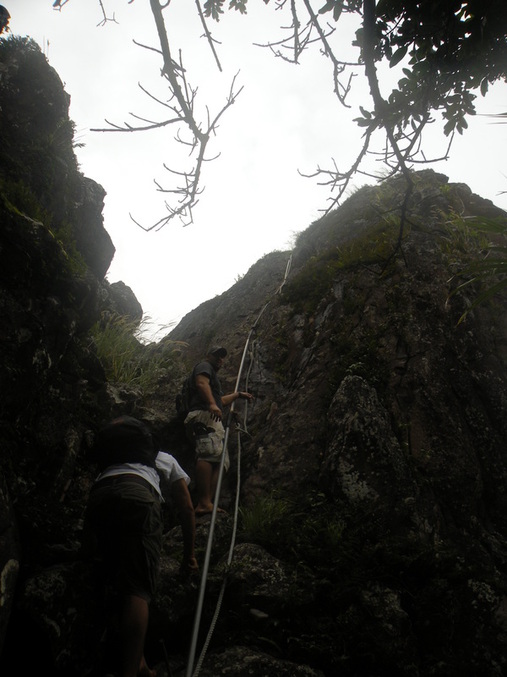 The climb up. Very thankful for the rope. 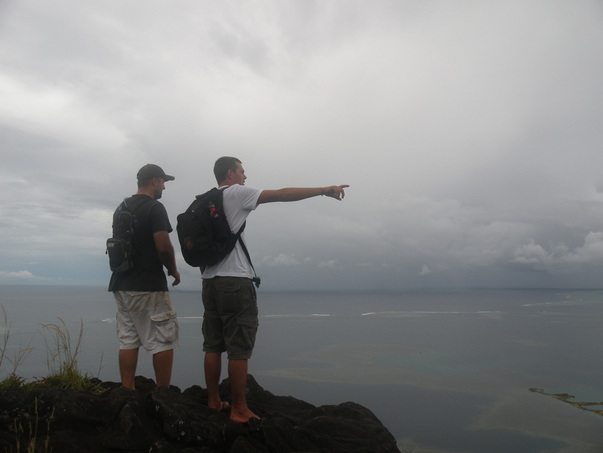 Pointing out atolls we have visited 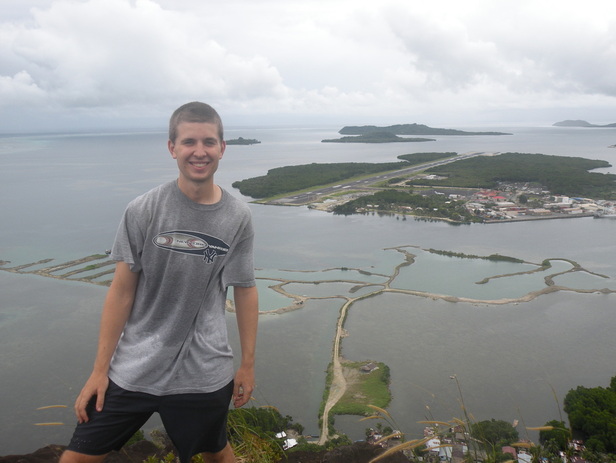 Was a pretty cloudy day so the visibility was poor. Can still make out the airport though!
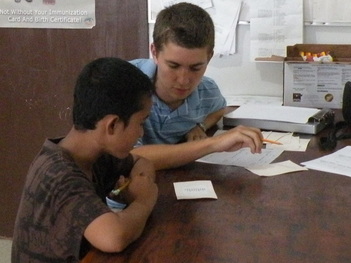 Conducting student reading assessments at Sapwalap Elementary School We have quite a challenge ahead of us.
Attached are the student reading level results with accompanying statistics.
It has taken quite some time to get all this data, but it is imperative that we know where we are before we start with our program. Tomorrow is Veterans Day, and Micronesians celebrate pretty much every holiday known to man, so we will get started next week. A bunch of us are headed to the outer island of Ant to go camping for the weekend. It will be difficult to get my head away from the large task in front of us, but a change of scenery is welcomed.
Despite the immensity of the challenge facing us, I know that our mission is crucial. The students here have more educational opportunities than most people in the world. The number of scholarships available to them are vast, if only they are equipped with the tools to achieve. Essentially, a motivated and diligent student in Micronesia can be educated through the graduate level for free. However, the average Micronesian student has many more challenges than their American counterparts.
Change will not happen overnight, but knowing how important our work is will certainly drive the entire MAHI team to persist throughout this great and worthy undertaking.
Pray for us!
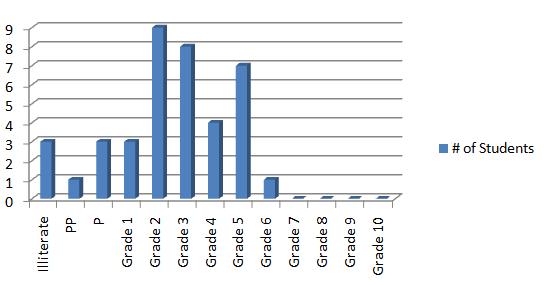 6th Grade Reading Level from one of our adopted schools (P=Primary, i.e. Kindergarten; PP=Pre-Primary) - Assessed 560 students in seven schools
- Average student is reading three grades below grade level
- 37 students are reading at Kindergarten level or below
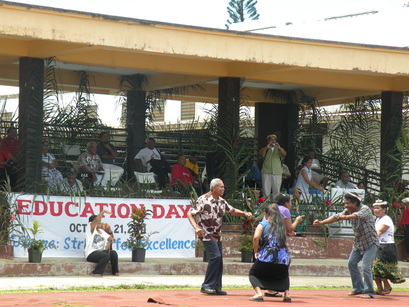 Today, Friday, is Education Day here in Pohnpei. The theme this year is “Striving for Excellence.” To celebrate, school was canceled and all the teachers and administrators gathered at a field to sing and dance.
I really don’t know how to follow that.
We have conducted reading assessments in Grades 6, 7 and 8 in three schools so far. I just crunched the numbers and here are the results so far:
83.5% of students are reading below grade level
31% of students are reading 4 grades or more below grade level
11% of students are reading at Kindergarten level or below, including four illiterate students
More results to come.
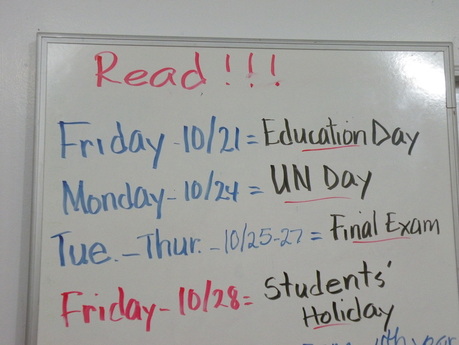 Not only are the schools off this Friday for Education Day, they are also off Monday for UN Day and next Friday for a "student holiday." On the school calendar only Friday 10/28 is recognized as an official "holiday." (On a more lighthearted note, check out these pictures from this past weekend. Went on the epic Six Waterfalls Hike deep in the jungle and went bottom fishing!)
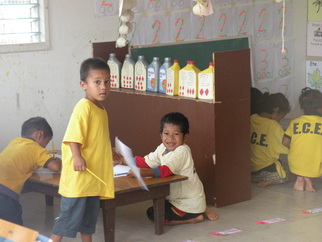 The vast majority of my time spent here in Pohnpei is going to be focused on improving the education system. I will be working closely with Mr. Miller Benjamin, MAHI’s Senior Educator. Mr. B has over 30 years of education experience on the island, after recently retiring as Principal from the SDA School here. His knowledge of the culture and education in Pohnpei will be invaluable on our mission. I am extremely excited to work with him. On Wednesday, John, Mr. B and I visited the seven lowest performing public schools on Pohnpei. Our eyes were opened to many of the problems we are going to face over the coming school year. There are many different areas we can focus our efforts, but we have decided to concentrate on reading and writing. We have learned through several teachers and following our intuition, that students cannot learn mathematics, science, or any other subject, unless they can read and write on grade level. Perhaps the biggest obstacle to getting students to read on grade level is when they start learning in English. In Grades 1-3 students are taught in Pohnpeian. What we found is that every grades curriculum is three years behind, so that a Grade 8 student is reading on a Grade 5 level. The situation is more severe than this however. When students start learning in English in Grade 4 it is not an instantaneous shift. Questions and explanations are still in Pohnpeian and it is not until Grade 6 or so at best when English is the primary language heard in the classroom. We will be conducting assessments to see exactly at what level the students are reading. I am fairly confident the majority of students will be at a minimum of 3-4 years behind. The obvious solution is to start teaching students in English beginning in First Grade but many in the Department of Education are opposed to such a policy change as they fear the loss of culture in the youth speaking their native language. Although their sentiments are understandable, the fact of the matter is that the policy is causing the students to fall behind for the rest of their education. While Pohnpeian is a beautiful language, it would undeniably be to the youth’s advantage for them to start learning in English at the start of their education. Pohnpeian is only spoken on this island, and their ability to read, write and think in English is critical to their future success and prosperity. Beyond the policy decision to delay learning in English, there are many other problems in the education system in Pohnpei. In many of the schools we visited, they were lacking in basic supplies, particularly textbooks. We found textbooks from the 1980s and many schools without enough books. Another key educational resource was also missing – teachers and administrators. Every other week the principals of all the schools are gone for a whole day attending meetings in Kolonia. Apparently, meetings in all sectors of government are very popular in Pohnpei. Also, several teachers were not present as they were attending workshops. Why they don’t have these meetings and workshops in the summer is beyond me. Several times, I had to step back and wonder where to even start in tackling these problems. While these site visits were very informative, we still have much to learn about these schools. We will be conducting assessments of the teachers and the teachers will be assessing themselves and their administrator(s). After this we will be conducting student reading assessments to find their reading level. Before we can help them, we have to know where they are, assessing the “damage” in a sense. Moreover, in assessing the teachers and administrators, we will have a better idea of the organizational integrity of the school and how to best assist and instruct them. I only touched the tip of the iceberg with the problems facing us in our efforts to raise the reading and writing levels at the seven schools we have adopted, but this is a cursory glance of what the main issues are from our first impression. Ideally, we will be able to dramatically improve the level of teaching and administration at these schools, thus increasing the level of reading and writing at all grade levels. Furthermore, this would be a sustainable program, as the teachers would remain in the schools year after year to continue being successful teachers. The educational world is in agreement that the most valuable education resource is the teacher. If we can produce great teachers on Pohnpei, we will have taken the largest and most critical step in providing the youth of Pohnpei with a quality education. These seven schools are only a trial run – hopefully we can expand it to all 35 public schools on the island. My ultimate dream for these schools, and for all of Pohnpei, is for a culture of achievement to spread throughout the island, originating in the schools from students seeking to fulfill their infinite potential by pursuing their education. I have no illusions that this dream will be easy and without obstacles. Indeed, it will be a long, arduous venture that will likely extend beyond my time here. But as Lao-Tzu famously said, “Even the longest journey begins with a single step.” Click here to see pictures from the site visits!
Greetings from Pohnpei! “Kaselehie” means hello and goodbye in Pohnpeian, like Aloha or Ciao. I had stumbled across this word many times before I came here and had no idea how to pronounce it. Go ahead, take a guess. The correct way is “ casa-lay-lee-ah” with the casa pronounced like the Spanish word for “house.” The past few days have been a whirlwind. Tremendous jetlag + experiencing massive culture shock for the first time is a brutal combination. My body is starting to know what time it is though and I’m learning more about the culture every day. I’m living with two roommates, Dale and Ian, who are really cool guys and have been very helpful in the transition process, answering a lot of questions and teaching me more about the culture. They are working on emergency management and public safety issues while they’re here. Upstairs is Kat and the resident three-year old, Kai. In a day or two John will be coming back from the states, which everyone is looking forward to. On Friday I met Mr. Benjamin, aka Mr. B, who I will be working closely with on the Professional Growth for Educators project. We will be working with seven schools across the island conducting assessments and looking to see how we can best help them. We are hoping to secure more funding so that we can expand the number of schools. Speaking of which, I will also be working on grant writing while I’m here. Somehow everyone thinks I’m a professional grant writer. I don’t know how that misconception started, but they need a professional grant writer so I suppose the only thing to do is step up to the plate and do my best! There’s so many things to write about I don’t even know where to begin. Here’s a quick piece of culture – when waving someone to come over to you, you need to be very careful of what hand gesture used. You’re supposed to wave someone over with your palm down, or if you’re feeling risky, sideways. If you wave someone over with your palm facing up it means, in politically correct terms, “Let’s go have sexual relations in the bushes.” I sure hope I don’t forget that one. Over the coming weeks, I will be writing more about Pohnpeian life and culture on topics such as transportation, food, social life, religion, politics, language, education, and infrastructure, to name a few. I’ll also be sure to post pictures as well. If there is anything you're particularly curious about, feel free to contact me. My full contact information is below and posted on the home page: Drew Robinson PO Box 2268 Kolonia, Pohnpei, FSM 96941 E-mail: [email protected] Skype: drew.robinson19
|






